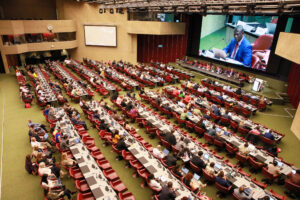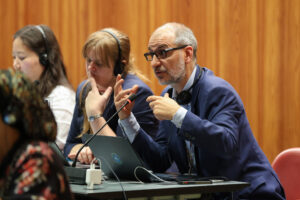Published June 6, 2025
By Rachel Radvany, Environmental Health Campaigner at the Center for International Environmental Law.
Preparations are still ongoing for the establishment of a Science-Policy Panel on chemicals, waste, and pollution prevention. After a week of negotiations in June 2024 in Geneva — the third of three scheduled Open-Ended Working Groups (OEWG 3) — which were meant to finalize the Panel, countries failed to reach an agreement. While much of OEWG 3 took place behind closed doors, the same delay tactics that have dominated other multilateral environmental spaces were on full display throughout the week.
OEWG 3 in Geneva focused on finalizing foundational documents, such as the institutional arrangements that would articulate the Panel’s and how it would operate, including key principles to guide its work and how to safeguard the panel from conflicts of interest. However, Member States were not able to make sufficient progress, so the OEWG was extended into an additional meeting. The draft text has been deferred to the next meeting (OEWG 3.2), which will take place from June 15-18 in Punta del Este, Uruguay. An intergovernmental meeting is also scheduled for adoption of the text back-to-back with the OEWG meeting, on June 19-20.
The OEWG, formed under UNEA resolution 5/8, was tasked with setting up the Panel. Many have called the future Panel the “third triplet” to the Intergovernmental Panel on Climate Change (IPCC) and the Intergovernmental Panel on Biodiversity and Ecosystem Services (IPBES). The Panel would provide functions such as horizon scanning to identify emerging issues, conduct assessments of current issues and identify potential solutions, facilitate information-sharing and communication, and capacity building to strengthen the science-policy interface. Key to note is the Panel will be a non-legally binding scientific body, with outcomes that are “policy-relevant but not policy prescriptive,” not designed to undertake risk or hazard assessments of specific chemical substances.

Key Reflections from OEWG 3
Conflicts of Interest
The chemicals industry has a track record of omission and manipulation of science, making it critical for the Science-Policy Panel’s credibility to have safeguards against conflicts of interest. The discussions in Geneva surfaced differing views on details — like which potential conflicts should be disclosed and how to determine whether they are “significant and relevant.” Such decisions should be left to an impartial committee, and past conflicts must be disclosed to avoid industry bias influencing the Panel’s work.
The meeting in Geneva recommended that the conflict of interest policy could be finalized after the Panel is set up. But to safeguard the integrity of the Panel’s work from vested interests seeking to delay regulation — a tactic common in the wider world of chemicals and waste policy — this policy must be in place before the Panel begins its work.
Participation
Participation of non-governmental observers is a key way to ensure transparency and credibility. Without it, the Panel’s work risks being questioned and its legitimacy undermined.
Participation of observers will enrich the work of the panel, by providing expertise that governments may not have access to. There are many different areas of expertise that are relevant to the Panel’s work — including but not limited to academic science, Indigenous knowledge, citizen science, and the health sector — and these will only serve to better inform the work of the Panel and ensure its outcomes are robust. The Panel’s mandate explicitly states the need for “inclusive participation, including indigenous peoples,” and Member States must ensure that these perspectives are recognized and protected within the text.
There is precedent in all other multilateral chemicals and waste spaces for robust observer participation, who contribute to the work, like the POPs Review Committee under the Stockholm Convention.
Politicization of the Negotiations
This negotiation suffered from the increasing and ongoing attempts to politicize international environmental multilateralism. Throughout the course of the meeting, some countries used various delay tactics to block progress on agreeing on the Panel’s text. Some of these tactics included raising procedural points and continuing to do so even after the question was answered, or refusing to engage until one country’s demands were met.
One key tactic was pushing “consensus” as the decision-making standard in the Panel, which would introduce de facto veto power that any country could use to delay progress on the Panel’s work. This is not a new effort — we’ve seen similar pushes in the Plastics Treaty negotiations — but rather a continued effort to remake multilateralism as a whole. In the specific context of the SPP, another concerning moment was the apparent confusion about the role of science and how science works. The repeated assertion: “Science cannot be negotiated, this is why we need consensus” — a cynical twist that seems aimed at manufacturing doubt and delaying policy action.
Politics also surfaced around the idea of creating a joint secretariat between the UN Environment Programme (UNEP) and the World Health Organization (WHO) — an idea many countries welcomed. Chemicals, waste, and pollution are intricately linked to health, and the WHO’s health expertise would be crucial to the Panel’s mission. However, certain countries opposed it, likely to limit WHO’s role and the Panel’s overall effectiveness.
Looking Ahead: OEWG 3.2 in Uruguay

Photo by IISDENB Mike Muzurakis
The failure to reach agreement in Geneva in 2024 was disappointing given the years of work that have gone into setting up this Panel. But, finalizing the foundational documents at OEWG3 would have meant compromising on key elements such as conflict of interest and observers’ participation in order to reach an agreement. Given that this Panel has the potential to shape global work on chemicals and waste for decades to come, it is better to take a bit more time to get the set-up right, and ensure that all the proper elements are included.
The resumed OEWG 3 in Uruguay will focus on finalizing the documents to establish the Panel (including the foundational documents) and the rules of procedure. The discussion will be clustered into three topics:
- Membership and functions of the Panel and its bodies, and decision-making;
- Foundational elements related to the rules of procedure and the draft decision to establish the Panel;
- Other rules of procedure, the draft decision to forward the rules, policies, and procedures to the governing body, and arrangements for the interim period before the first Panel meeting.
A Chance for Real Progress
This Panel has the potential to become a cornerstone of global chemicals and waste governance— if it is built on transparency, independence, and inclusivity. CIEL and partners will continue to follow these negotiations and support Member States in finalizing a Science-Policy Panel that will adequately contribute to the prevention of pollution and protect people and the planet.
